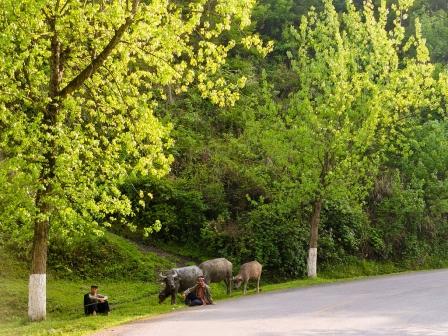By Luo Yang, Guest Blogger
For the last month, American Forests’ policy team has played host to a distinguished visitor, Luo Yang, from China, who was here to learn more about America’s business practices, our forestry work and other cultural differences. We have greatly enjoyed Luo’s presence and wanted to give our Loose Leaf readers a chance to experience America’s forests through his eyes. For the next three Fridays, we’ll be featuring blog posts written for us by Luo.~K&M
Hello, I am Luo Yang from People’s Republic of China, and I care deeply about forests.
When I was a college student, I had an unforgettable experience, which cemented my love of forestry. As an undergraduate at Nanjing Forestry University 1987, I took part in a two month forest inventory in the expansive primitive forest in northeastern China. Everything in the forest made me feel very happy — the fresh air, clean water, the wandering animals. I liked the feeling of being close to the water, to the soil and to the nature. This experience was a main reason I decided to take the test for graduate studies on forest management and eventually received my master’s degree in 1991.

I worked for Guizhou Forest Inventory & Survey Institute from 1991 to 2006, progressing from an engineer assistant to a professor’s level engineer. During that period, I participated in two forest surveys in geographic areas beyond my province: one was in southern China and another in the Tibetan area. Both experiences were exciting and wonderful.
In 2006, I got my Ph.D. in forest management from Nanjing Forestry University. Since then, I have worked for Guizhou Forestry Academy. As a researcher, I mainly focus on studying public welfare forest restoration, forest biodiversity protection and forest sustainable development. I am also the president of the academy and am responsible for the management of scientific research and cooperation.
I am in the U.S. as a member of a training group sent by our government to improve our modern business management. We spent four months in Stony Brook, New York, where we took lessons on international business, government management, human resources, emerging technology and other topics. As scheduled, I needed to have fellowship in an American organization, and I was very happy to have an opportunity to spend a month at American Forests. Being attracted by the opening words on its web page — “We are people who care about — and for — forests.” — I come here hoping to know how many people there are in American Forests, what they do, how they inform policymakers and the public about forests’ benefits.